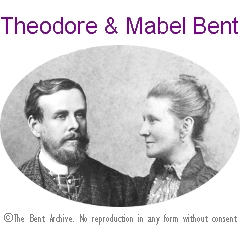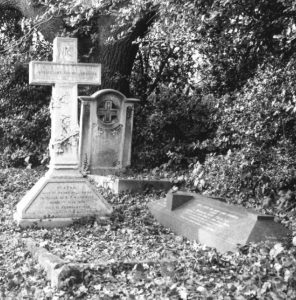
“The bells of Mykonos were tolling mournfully, to tell of the death of the young man; and I shuddered involuntarily now that I knew my desire was to be realised. I was to be present at a mœrologia over the dead.” (J.T. Bent, The Cyclades, or Life Among the Insular Greeks. London, 1885, p. 215)
Full of irony is Theodore’s tale about his quest on Cycladic Mykonos to hear the island’s celebrated death-songs – the mœrologia. On that same trip, on nearby Andros, he suffered from severe malarial symptoms, perhaps his first, we are not told, and this is the malady that was to kill him, just some fifteen years later. Firmly C of E, there were no mœrologia in the small country graveyard in Theydon Bois at his funeral. Perhaps in the swaying branches overhead, though, Mabel might have thought she could hear something of the ‘death-wails of Mykonos’, or a hymn to Kalliope and Apollo.
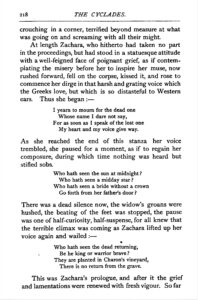
Theodore and Mabel’s grave and memorial (above) is in the churchyard of St Mary’s, Theydon Bois, Essex. Theodore’s epitaph reads: ‘Here, after his many long journeys rests J. Theodore Bent, FRGS, FSA, husband of Mabel Virginia Anna Hall-Dare, son of James and Margaret Eleanor Bent of Baildon House, Yorks. “To be with Christ which is far better'”.
Theodore Bent, born 31 March 1852, died on 5 May 1897 of complications from his recurring malaria, after his final Arabian trip, he was only 45. His obituaries were many and varied, and provide a condolence book of biographical details that contribute to our portrait of a most likable and capable personality. Mabel, of course was bereft, and took herself off immediately to her country home, Sutton Hall, outside Macclesfield, in the north of England.
‘Morning Post’ – Monday, 24 May 1897 : “Mrs. Theodore Bent wishes to thank her friends very much for their many kind letters of sympathy. Having been so recently ill herself, she is unable as yet to make any other acknowledgement. She is at present out of town.”
‘The Lady of the House’ – Tuesday, 15 June 1897: “Mrs. Theodore Bent has been seriously ill since her husband’s death, the shock being doubly hard to bear owing to her own recent illness. Far from being able to attend his funeral, as stated by an English paper, Mrs. Bent was unable even to leave her room; and those who know how singularly happy her married life was, and what thorough ‘comrades’ she and her husband were, can well understand the terrible blow which has fallen on her. Mr. and Mrs. Bent both suffered from fever in Arabia, and were weak and ill when they started from Aden in a French vessel bound for Marseilles. Notwithstanding this, they received little attention from the doctor and stewardess, and had to attend to themselves as best they could [I assume this is verbatim], the fever being intermittent. The sudden chill contracted the day after his arrival in London was too much for Mr. Bent’s already enfeebled health, and he rapidly sank. If sympathy could alleviate grief, Mrs. Bent would be well ere this; and the letters of condolence she has received from the Royal Geographical Society and other distinguished bodies show the esteem and affection felt for Mr. Bent, who, with all his undoubted mental gifts, was unaffected and modest to the degree only see in really great minds. He had nearly finished a book on Arabia, and in the future Mrs. Bent may perhaps complete it.”
The British Newspaper Archive is an invaluable resource (accessed November 2020); a subscription is required to view the original material, but the basic, sad details of Bent’s demise are provided.
These next pages [in progress, November 2020] will compile a list of obituaries, with links to the original sources (although some of these links are set for the US), where possible, as well as extracts, some short, some lengthier, and from all corners of the globe, as you will see, and as is befitting for such a remarkable traveller – Ars longa, vita brevis …
(For obituaries for Mabel Bent (1847-1929) see below.)
“Mrs. Theodore Bent can recommend A. Lovett as Butler: four years’ character; leaving through death. – A.L., 13 Great Cumberland-place, W.” (Morning Post – Thursday 13 May 1897)
THEODORE BENT – OBITS & PIECES
The Times, May 7, 1897: “We regret to announce the death of Mr. Theodore Bent, the well-known traveller and archaeologist… Mr. Bent’s death will be a great shock to a wide circle of friends, to whom his kindly, genial, unaffected disposition had greatly endeared him.”
The Athenæum, N° 3629, May 15, 1897, page 657: “To the great grief of his friends Mr. Theodore Bent died last week in the prime of life. He was forty-five years old, yet he never looked his age, and gave one the impression of being still quite a young man, full of energy and vitality… His death is a real loss both to archaeology and the cause of geographical discovery, and his friends will long lament one so kind, genial, and unassuming, who never sought for selfish advantage, and was always eager to profit by the knowledge of those more learned than himself.”
The Athenæum, No 3776, March 10, 1900, pp. 296-7 (from a review of Southern Arabia): “The late Mr. Theodore Bent was not a scientific archaeologist of the modern standard, but his death was nevertheless a severe loss to archaeology. He was a keen and untiring explorer, willing to sacrifice time, money, and personal comfort to his daring pursuit, and sometimes succeeding in a manner that might well arouse the envy of much better equipped scholars. We shall not easily find another to fill his place, with equal zeal, energy, perseverance, and self-devotion, and aided by a wife who shared to the full his courage and enthusiasm.”
Graphic, May 15, 1897: “The death of Mr. Theodore Bent – announced yesterday – is a distinct loss to Eastern archaeology, in the study of which the indefatigable explorer had spent the best years of his life. He was only forty-five years of age, and had but recently returned from his third and last expedition into Southern Arabia, where both Mr. Bent and his wife – who accompanied him in nearly all his journeyings – had been attacked by malarial fever. Coming home he developed acute pneumonia and died at a late hour at his house in Great Cumberland Place.”
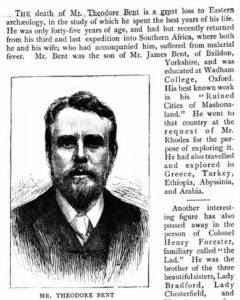
The Graphic, May 15, 1897, p. 602: “Our Portraits – The death of Mr. Theodore Bent is a great loss to Eastern archaeology, in the study of which he spent the best years of his life. He was only forty-five years of age, and had but recently returned from his third and last expedition into Southern Africa [sic, Arabia], where both he and his wife, who had accompanied him, suffered from malarial fever. Mr. Bent was the son of Mr. James Bent, of Baildon, Yorkshire, and was educated at Wadham College, Oxford. His best known work is his ‘Ruined Cities of Mashonaland’. He went to that country at the request of Mr. Rhodes for the purpose of exploring it. He also travelled and explored in Greece, Turkey, Ethiopia, Abyssinia, and Arabia.”
The Journal of the Anthropological Institute of Great Britain and Ireland, Vol. 27 (1898), pp. 546-565 : “In the death of Mr. J. Theodore Bent, the Institute has to deplore the early termination of a life of remarkable achievement and high promise. An intrepid explorer and a ripe scholar, Mr. Bent was also a man of singularly attractive and engaging character…”
The Antiquary, June 1897 [The Antiquary, Vol. 32, Jan-Dec 1897], p. 165 : “Readers of the Antiquary will have heard with much regret of the death of Mr. J. Theodore Bent, F.S.A. Mr. Bent, who was in the forty-sixth year of his age, was both an explorer and an antiquary, and he was one of those fortunate persons whose writings at once caught the ear of the public… Had Mr. Bent’s life been spared to a longer period, there is no doubt that he might have hoped to take a fairly high place in the niche of fame.”
The Annual of the British School at Athens, III, 1896-1897, p. 224: “The Committee have to regret the loss of one of their number, Mr. Theodore Bent, whose recent death is a severe blow to the cause of archaeological exploration. To the seat thus left vacant Professor Ernest Gardner, formerly Director of the School, has consented to accept nomination.”
The Geographical Journal, Vol.9(6), 1897, pages 670-1: “It is with much regret that we record the premature death of Mr. J. Theodore Bent, well known to the geographical world for his archaeological explorations in various parts of Africa and South-West Asia. Mr. Bent had but recently returned from his last expedition to Sokotra and Southern Arabia, on which he had suffered severely from malarial lever. A chill caught on the way home brought about a relapse, and, pneumonia setting in, he succumbed after a short illness on May 5, at the early age of forty-five years… Mr. Bent’s kindly and genial nature had endeared him to a wide circle of friends, for whom his loss will be keenly felt. To our Society, of which he became a Fellow and Member of Council in 1890, he always readily communicated the results of his journeys, and both the Proceedings and Journal bear witness to the wide range of his travels.”
The Geographical Journal, Vol. 9(6), 1897, p. 674. The opening remark of the President of the Royal Geographical Society, Sir Clements Markham, at the Ordinary Meeting, on May 10, 1897: “I must allude to the loss we have sustained by the death of Mr. Theodore Bent. He generally, during the last few years, made interesting excursions into unknown parts of Arabia and Africa, and afterwards read us in this room most interesting papers; and, judging from the very large audience he always had, I am sure that these papers were fully appreciated. He was a very accomplished man, both as an archæologist and as a geographer, a charming companion, and a true friend; perhaps it would not befit me to dwell upon some of his still higher qualities. You will remember that his wife, Mrs . Bent, always accompanied him in his journeys, and shared all his hardships and dangers. I am sure that all of us will feel the deepest sympathy for Mrs. Bent in her great bereavement.”
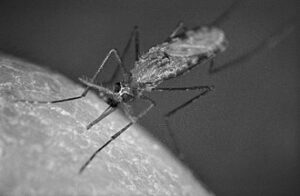
Nature, 13 May, 1897, page 35. “With much regret we have to announce the death, on May 5, of Mr. J. Theodore Bent, who had just returned from a journey, with Mrs. Bent, in Sokotra, and in southern Arabia, in the course of which they had made some remarkable discoveries. Both had suffered from malarial fever, and Mr. Bent succumbed to a subsequent attack of pneumonia… Mr. Bent read many important papers to the Royal Geographical Society, the British Association, and other Societies. His unique collections of antiquities have been exhibited at the Royal Society’s conversaziones, and his gatherings from numerous wanderings made his house a veritable museum. While his death is a serious loss to archæology and geography, the personal sorrow which it occasions is greater than in the case of most explorers. Mr. Bent had a very large circle of devoted friends, which, with a frank kindliness peculiarly his own, he was ever widening. The unaffected heartiness of his manner to all, will not soon be forgotten. Although he died at the age of forty-five, Mr. Bent leaves behind him the memory of more kind actions and helpful words than can be placed to the credit of most men whose lives have ripened into old age.”
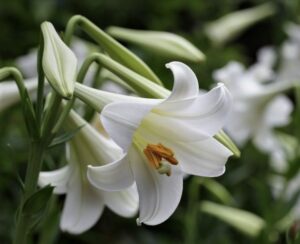 Bulletin of Miscellaneous Information, Royal Gardens, Kew, 1897, p. 206: “In the premature death of Mr. J. Theodore Bent, the distinguished traveller, geographical and botanical science have sustained a grave loss. It occurred suddenly just as he had reached London from his last expedition to Sokotra and Southern Arabia. A chill caught on the way home brought on acute pneumonia, and he died on May 5, at the early age of 45 years. Mr. Bent and his wife, who was his constant companion, were intrepid travellers in the East, in Arabia, and in Africa… Mr. Theodore Bent possessed a singular charm of manner, and an eager intelligence. His own object in travel was mainly archaeological. But he was keenly anxious to assist any other branch of science to which he could be of use.”
Bulletin of Miscellaneous Information, Royal Gardens, Kew, 1897, p. 206: “In the premature death of Mr. J. Theodore Bent, the distinguished traveller, geographical and botanical science have sustained a grave loss. It occurred suddenly just as he had reached London from his last expedition to Sokotra and Southern Arabia. A chill caught on the way home brought on acute pneumonia, and he died on May 5, at the early age of 45 years. Mr. Bent and his wife, who was his constant companion, were intrepid travellers in the East, in Arabia, and in Africa… Mr. Theodore Bent possessed a singular charm of manner, and an eager intelligence. His own object in travel was mainly archaeological. But he was keenly anxious to assist any other branch of science to which he could be of use.”
Black & White, 13 May 1897 (p. 608): “Mr. Theodore Bent, the indefatigable explorer of South East Africa and Arabia, has passed in his prime at the early age of forty-four [sic, 45]. The scenes of his wide travels embrace Greece, Asia Minor, Persia, Mashonaland, Abyssinia and Arabia, and various interesting volumes are left to attest the explorer’s learning and intrepidity.”
The Manchester Guardian, 8 May 1897: “Mr. Bent’s death will be greatly regretted, for he had done real service to the cause of geographical and antiquarian research.”
Science, vol. 5, no. 126, 1897, pp. 838-842. Scientific Notes and News: “Mr. Theodore Bent, known for archaeological and geographical explorations, died on May 5th from the effects of malarial fever, contracted while carrying out explorations in Arabia.”
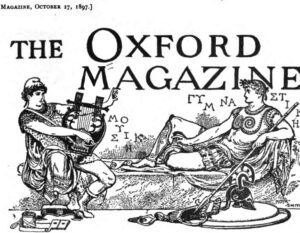 The Oxford Magazine, Vol. 15, 1896-1897, Oct-Jun., p. 308: “Wadham College has lost [one] of its most valued and distinguished members… Mr. Bent has been lost to us prematurely, a victim to his adventurous spirit of exploration. He had long since made a name as a traveller, a geographer, historian, and archaeologist, but we must lament that he was not spared to gather up and give us in more permanent and considered form the results of his many investigations.”
The Oxford Magazine, Vol. 15, 1896-1897, Oct-Jun., p. 308: “Wadham College has lost [one] of its most valued and distinguished members… Mr. Bent has been lost to us prematurely, a victim to his adventurous spirit of exploration. He had long since made a name as a traveller, a geographer, historian, and archaeologist, but we must lament that he was not spared to gather up and give us in more permanent and considered form the results of his many investigations.”
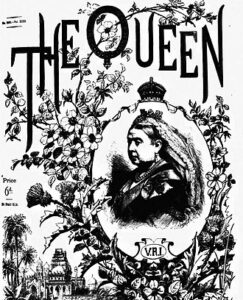
The Queen, The Lady’s Newspaper. May 15, 1897, p. 973. Mr J. Theodore Bent. The death of Mr Theodore Bent, the well-known traveller and archaeologist took place on the 5th inst. [May, 1897] at his house in Great Cumberland-place, at the early age of forty-five years. Mr and Mrs Bent left England last November for the purpose of exploring the island of Sokotra, and also of travelling in Southern Arabia. They made a successful journey through Sokotra, and obtained a good deal of fresh archaeological material. On their return to Aden Mr and Mrs Bent made a journey into the Yaffi and Fadthli countries. Fifty miles out of Aden they came into country quite unvisited by Europeans. Here they found a fine range of mountains, with snow and frost and plenty of ruined sites. Unfortunately, on their return to Aden they were both prostrated with malarial fever. On becoming convalescent they returned home, and on the way home Mr Bent seems to have caught a chill, which brought on a relapse of the fever, complicated with pneumonia, from which he was unable to rally. Mr Bent’s death is a great loss to archaeological research, as well as to geography. He was the only son of the late Mr James Bent, of Baildon House, near Leeds, and was educated at Malvern Wells, Repton School, and Wadham College, Oxford, where he took honours in the history school. After his marriage in 1877 to Mabel, daughter of the late Mr Robert Westley Hall-Dare, D.L., of Newtonbarry House, county Wexford, he, with his energetic and accomplished wife, spent several months each year in exploring little-known districts and sites, from which he never failed to reap a harvest of fresh geographical and archaeological knowledge. Mr Bent was an excellent linguist; he spoke modern Greek like a native. One of his earliest visits was to the Republic of San-Marino, on which he wrote an interesting little volume. He travelled extensively in Greece and Asia Mino, and in 1885 published a volume on ‘The Cyclades; or Life Among the Insular Greeks’. He afterwards visited the Bahrein Islands, on which he contributed a paper to the Royal Geographical Society. Perhaps he is best known by his investigations of the Bimbabwe [Zimbabwe] ruins in Mashonaland, which he and Mrs Bent visited in 1891. The narrative of this interesting expedition has gone through several editions. In 1893 they visited Abyssinia, and made some valuable investigations among the ruined cities of that country. The last visit was the third to Southern Arabia, whence Mr Bent succeeded in adding considerably to our knowledge of the Hadramut country. In 1895-96 the western shores of the Red Sea and the north of Suakin was the scene of Mr and Mrs Bent’s explorations, and here among the coast mountains some remarkable remains of old Roman gold workings were discovered. The results of these journeys were given to the world through the Royal Geographical and other societies, and in books, which were always full of interest. Mr Bent’s death will be a great shock to a wide circle of friends, to whom his kindly disposition had greatly endeared him. He was a Fellow of the Society of Antiquaries and of the Royal Geographical Society; of the latter he had been a member of the council.

The Yorkshire Evening Post, Saturday, May 8, 1897: “The Late Mr. Bent – Mr. Theodore Bent, who has just died in London at the age of 45, will be regretted as an accomplished archaeologist as well as an indefatigable explorer. A Yorkshireman by birth [sic], he has told us nearly all we know about the mysterious ruins at Zimbabye, and scattered more or less through Mashonaland and the Transvaal. Mr. Bent had also travelled extensively in Greece, Asia Minor, and Abyssinia, chiefly in quest of ruined cities and other ancient monuments. His zeal for research of this kind has killed him. While travelling in Southern Arabia he contracted malarial fever, and from this attack he never really recovered.”
The Westminster Gazette, May 7, 1897, p. 10: “Death of Mr. Theodore Bent. We regret to announce the death of Mr. Theodore Bent, the well-known traveller and archaeologist, who passed away at the early age of forty-five, on Wednesday evening, at his house in Great Cumberland-place. On his recent return to town from an African [sic] expedition, in company with his wife, he was suffering from acute pneumonia, brought on by malarial fever, from which Mr. Bent was recovering, as his wife had already done, when he contracted a chill. Greece, Turkey, Ethiopia, Abyssinia, Arabia, and Mashonaland were almost as familiar to him as Piccadilly, and the records of his travels in these countries are both instructive and entertaining. His name will, perhaps, be best known in connexion with explorations among the “Ruined Cities of Mashonaland”. At the request of Mr. Rhodes he, six or seven years ago, undertook a journey into Rhodesia, the funds being supplied from a joint grant by the British South African Company and the Royal Geographical Society… Mr. Bent’s death is a distinct loss to archaeological research as well as to geography… and will be a great shock to a wide circle of friends.”
London and China Express, Friday, 7 May 1897: “We regret to announce the death of Mr. Theodore Bent, the well-known traveller, which took place suddenly just as he had reached London from his last expedition into Africa [sic]. He was suffering from acute pneumonia when he arrived, and although every attention was bestowed on him as soon as he reached his own home, he gradually became worse and passed away. Mr. Bent spent his life in exploring the antiquities of the East.”
 The Malay Mail, May 8, 1897: “May 7 [1897] – The death is announced of Mr. James Theodore Bent, traveller and author. The death of Mr. Theodore Bent will be widely lamented in the worlds of science and literature. It is a traveller and explorer that he is best known. In 1891, it may be remembered, Mr. Bent, accompanied by his accomplished wife, who is no less intrepid a traveller than himself, started for his adventurous journey to Central South Africa for the purpose of exploring and excavating those ancient massive and mysterious ruins that exist in Mashonaland. After a year spent in camp at Zimbabwe Mr. and Mrs. Bent returned, and the results of their investigations were told in that delightful book The Ruined Cities of Mashonaland. Mr. Bent will be much missed in London, where his house in Upper Cumberland Place [sic], which is filled with momentoes of his journeys, has been the resort of many famous and learned people.”
The Malay Mail, May 8, 1897: “May 7 [1897] – The death is announced of Mr. James Theodore Bent, traveller and author. The death of Mr. Theodore Bent will be widely lamented in the worlds of science and literature. It is a traveller and explorer that he is best known. In 1891, it may be remembered, Mr. Bent, accompanied by his accomplished wife, who is no less intrepid a traveller than himself, started for his adventurous journey to Central South Africa for the purpose of exploring and excavating those ancient massive and mysterious ruins that exist in Mashonaland. After a year spent in camp at Zimbabwe Mr. and Mrs. Bent returned, and the results of their investigations were told in that delightful book The Ruined Cities of Mashonaland. Mr. Bent will be much missed in London, where his house in Upper Cumberland Place [sic], which is filled with momentoes of his journeys, has been the resort of many famous and learned people.”
Bolton Journal & Guardian – Saturday 15 May 1897: “Mr. Theo. Bent – The death of Mr. Theodore Bent removes a man who knew more about Rhodesia and the domains of the Chartered Company than any other man but Mr. Selous. His name will be specially associated with the discovery of the ruins of Zimbabwe which some have associated with the land of Ophir whence Solomon got his treasures. Mr. Bent was a son of Mr. James Bent, of Baildon, Yorkshire, and was born in 1852, Educated at Wadham College, Oxford, he became a traveller and explorer at a comparatively early age, and since 1877, when he married a daughter of the late Mr. R.W. Hall-Dare, of Wexford, his intrepid wife had been the companion of many of his journeys. The scenes of his travels were Greece, Asia Minor, Persia, Mashonaland, Abyssinia and Arabia. Among his publications were ‘The Cyclades; or, Life among the Insular Greek’, published in 1885; ‘Ruined Cities of Mashonaland’, 1892; and ‘Sacred Cities of the Ethiopians’, 1893. He died of pneumonia.”
Bingley Chronicle – Friday 21 May 1897: “The death of Mr. Theodore Bent at the early age of 45 is (says the Pall Mall Gazette) a great blow to the cause of geography and archaeology. Mr. Bent and his wife were among the intrepid travellers we possess, and their annual excursions to out-of-the-way regions have added enormously to our knowledge. Their best-known book is that on the ruins of Zimbabye, in Mashonaland, which they visited in 1891, but more recently they have added to their laurels in Southern Arabia, following the course of the Hadramaut valleys and discovering many ruined sites.”
The Shipley Times, May 15, 1897: “Death of a noted Baildonian – The death recently took place at his house in Great Cumberland Place, London, of Mr Theodore Bent, the well-known traveller and archaeologist. He was the only son of the late Mr James Bent, of Baildon, and was born in 1852 in the house at Low Baildon now occupied by Mr Smith Feather… Perhaps he is best known by his investigations of the Zimbabwe ruins in Mashonaland, which he and Mrs Bent visited in 1891… Mr Bent’s death will be a great shock to a wide circle of friends, to whom his kindly, genial, unaffected disposition had greatly endeared him.”
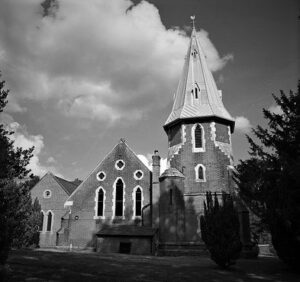
The Essex County Chronicle, May 14, 1897: “Funeral of a Distinguished Essex Traveller – The funeral of the late Mr. J. Theodore Bent, the distinguished traveller and archaeologist, took place at Theydon Bois on the 8th inst., in the presence of a large number of relatives and friends. The remains were interred in the burial place of the Hall-Dare family, with which the deceased gentleman was connected by marriage… The deceased travelled extensively in the lesser known parts of Greece, and in the islands of the Ægean Sea, accompanied by his wife, and in 1885 published a volume on the Cyclades. Afterwards he visited Mashonaland for archæological purposes, on his discoveries in which he wrote a word that has passed through several editions… His last expedition was to the west coast of the Red Sea, and the Hadramut district of Arabia, in the former of which he discovered some remarkable remains of the old Roman gold mines. In Arabia he contracted a serious attack of malarial fever, followed by pneumonia, which proved fatal. He was a Fellow of the Society of Antiquaries and a member of the Council of the Royal Geographical Society, and was much beloved by a wide circle of friends. The funeral ceremony was performed by the Vicar of Theydon Bois, the Rev. C.E. Campbell; the Rev. J.S. Sinclair, vicar of St. Dionis, Fulham; and the Rev. E.W. Hobson [Bent’s bother-in-law], incumbent of Portadown, Ireland.”

Illustrated London News, May 15, 1897, page 669: “Mr. Theodore Bent died on Wednesday evening last week at his house in Great Cumberland Place. Though he was only forty-five years of age, he had made himself famous as an intrepid traveller and archaeologist of great taste and resource. Moreover, his career, being early begun, may be said to have been a long one… His travels in Greece and Asia Minor are recorded in his book on “The Cyclades, or Life Among the Insular Greeks”… The Bahrein Islands were afterwards visited. Then followed the investigation of the Zimbabwe ruins in Mashonaland, of which an interesting record was made; and the visit to the ruined cities of Abyssinia. Southern Arabia then became the field of Mr. Bent’s investigations. In 1895, accompanied by his wife, he explored the western shores of the Red Sea and the north of Suakin, where he discovered some important traces of old Roman gold-mining. Last November the island of Sokotra was successfully visited. On their return to Aden, the travellers visited portions of the surrounding country quite unknown to Europeans, and, unfortunately, they caught a malarial fever. Recovering, they turned homewards, stopping for a few days at Marseilles; and there Mr. Bent caught a cold which brought a return of fever, complicated with pneumonia, from which he could not rally. A wanderer for twenty years, he came home at last only to die. He was a member of the Council of the Royal Geographical Society, through whose journals many of the valuable results of his investigations in distant lands were given to the world.
The Morning Post, March 15, 1900: “Theodore Bent was one of a comparatively small band of travellers prepared to face countless discomforts and to undergo serious perils in the wildest, the unhealthiest, and the most inhospitable regions if only they can add something to the general stock of scientific knowledge.”
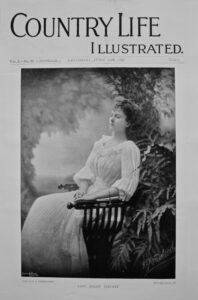
Country Life, June 12, 1897, p.606. Review of Richard Davey’s The Sultan and His Subjects: “CORDIAL and sincere as is my appreciation of the merits of Mr. Richard Davey’s timely book, which, coming from the pen of a writer almost unknown to fame, has secured words of willing praise in many well-informed quarters, it shall not be written here that its author has added to the sum of human knowledge. None but scientific enquirers like Darwin or Newton, men who discover by observation the operation of Laws of Nature that were not understood before their time, or men who, like my poor friend Theodore Bent, who has recently died in the prime of life, discover old and valuable facts which the world, even the antiquarian and learned world, has forgotten, in inscriptions of which the key seemed entirely lost, really place themselves in a position from which they may succeed in adding to the sum of human knowledge.”
Country Life, Sept 17, 1898, p.327. Literary Notes: “… the late Theodore Bent was not merely an intrepid and intelligent traveller, he was a writer of the first order of merit.”
Liverpool Mercury, May 10, 1897: “Mr. James Theodore Bent, F.S.A., F.R.G.S., whose death has just been announced was born in this city in 1852. He and Mrs. Bent were ardently devoted to archaeological travel, and together they visited the little Republic of San Marino, the Isles of Greece, Mashonaland, Abyssinia, Socotra, [and] Southern Arabia.”
South Africa, 8 May 1897, 38: “The readers of South Africa, especially those who are to be found in distant Rhodesia, will hear with great regret of the death of Mr. J. Theodore Bent, the well-known archæologist, which took place on Wednesday evening [5 May, 1897] at his house in Great Cumberland Place… [Year after year] Mr. Bent continued to do good work for archæology and geography, and he has at last fallen a martyr to his zeal.”
New York Times, May 7, 1897: “An English author dead – James Theodore Bent, the Traveler, dies in London.”
American Register, May 22, 1897: “Mr. James Theodore Bent, the well-known traveller and author of works of travel, died May 6th [sic]. He was born in Yorkshire, March 30th 1852. He was educated at Wadham College, Oxford, and spent the greater part of his life in travelling in the East. He was familiar with the districts of Asia Minor, had been in all parts of Persia, Arabia and Abyssinia. He knew Greece well. His books are excellent specimens of their class. In 1885 he published ‘The Cyclades; or, Life Among the Insular Greeks’.”
The San Francisco Call, June 17, 1897: “An Eccentric Traveler – J. Theodore Bent, a wealthy Englishman who has achieved some notoriety by visiting out-of-the-way places and writing books about them, has just died on his return from the Island of Socotra, from the consequences of a fever contracted there.”
The Salt Lake Herald, May 7, 1897: “Called home – James Theodore Bent, the well-known traveller and author of works of travel, is dead.”
Western Morning News, December 31, 1897: “Other noted men who have paid nature’s debt [include] Mr. Theodore Bent, the African traveller…”
The Adelaide Advertiser, May 8, 1897: “The death, in his 45th year, is announced of James Theodore Bent, the well-known traveller. The travels of Theodore Bent extended to Greece, Asia Minor, Persia, Mashonaland, Abyssinia, and Arabia. He recorded his experiences in several volumes and newspaper articles. The best known of his works, published in 1892, dealt with the ruined cities of Mashonaland. In his Sacred Cities of the Ethiopian Mr Bent gave a record of a year’s travel for purposes of research in Abyssinia in 1893. The book related the experiences of Mr and Mrs Bent on their journey to and from Axum, and gave much valuable information concerning the manners and customs of the people and their primitive form of Christianity.”
Zeitschrift der Gesellschaft für Erdkunde, Band XXIV, Januar bis December 1897, p. 326 : “Ebenfalls in England starb J. Theodore Bent, bekannt durch verdienstvolle Reisen in Süd-Arabien, in Abyssinien, Mashona-Land und vielen anderen Gegenden. Der aufsergewöhnlich beliebte, von einem grossen Freundeskreis betrauerte Forscher hat ein Alter von 45 Jahren erreicht.”

Le Globe. Revue genevoise de géographie, Année 1897 (36), pp. 179-180: “Le Times nous apporte la nouvelle du décès de l’un de nos contemporains qui ont marqué par leurs découverts archéologiques et géographiques. Né en 1852 dans les environs de Leeds [sic] et élève de l’Université d’Oxford, Théodore Bent s’associa, en 1877, une compagne accomplie qui l’accompagna courageusement dans ses voyage les plus aventureux. Il débuta par un petit volume intéressant sur la république de Saint-Marin. Parlant le grec moderne comme un Grec même, il publia, en 1885, la Vie au milieu des Grecs insulaires. San voyage semé d’aventures dans la portion absolument inexplorée de la Cilicia Tracheia révéla les restes imposants, au point de vue archéologique, d’une de ces monarchies ecclésiastiques de l’Asie Mineure, don’t Olba était la capitale. Bent visita le groupe des îles Bahrein, puis les ruines imposantes et mystérieuses de Zimbabwe dans le Mashonaland. En 1893, M. et Mme Bent firent des découverts intéresantes dans les antiques cités abyssiniennes. Par trois fois ils pénétrèrent dans l’Arabie heureuse et l’Hadramant. De retour à Aden, Bent échappa à peine à un accès de malaria, et un refroidissement, compliqué d’une pneumonie, saisit au retour sa constitution minée et l’emporta à l’âge de 45 ans seulement.”
Journal des voyages et des aventures de terre et de mer, ser.2:t.1-2 (1897), p. 650: “On annonce aussi la mort, en Angleterre, de M. Théodore Bent qui, après avoir visité les ruines de Zimbabye, dans l’Afriqueaustrale, en 1891, avait exploré en1895, le Hadramaout, dans le Sudde l’Arabie; M. Bent était récemment de retour d’un nouveau voyage en Afrique.”
Annales de Géographie, vol. 6, no. 28, 1897, pp. 375-384. “Necrologie – L’explorateur et archéologue Théodore Bent, revenue depuis peu d’un fructueux voyage à Socotra et dans l’Arabie méridionale, est mort a Londres le 5 mai, des suites de la malaria. Plusieurs saisons passées dans la Méditerranée avaient renforcé son goût pour les études archéologiques. C’est ainsi qu’il avait successivement visité les îles Bahrein, dans le golfe Persique, les ruins du Machonaland (Zimbabye), qui lui inspirerent son livre: The ruined cities of Mashonaland (London, 1892), l’Éthiopie, surtout la ville d’Axoum (The sacred city of Æthiopians [sic], London, 1893), enfin par deux fois l’Hadramaout. Il a notablement contribué au progrès de nos connaissances sur l’histoire préarabe et préphénicienne.
Le Temps, 8 mai 1897: “Un explorateur célèbre et un écrivain de valuer, M. Théodore Bent, vient de mourir à Londres, où it était à peine de retour de son dernier voyage en Afrique [sic]. Ce fut lui qui, accompagné de sa femme, étudia pour la première fois, en 1891, les ruines probablement phéniciennes de Zimbabye, dans le Machonaland, découvertes en 1867 par M. Phillips. Il avait fait auparavant des voyages intéressants en Abyssinie. Plus récemment, il explora une partie fort peu connue de l’Arabie australe, les vastes étendues de l’Hadramaout, où, au lieu de trouver des déserts arides, habités par des nomades, il ne fut pas peu surpris de constater l’existence de vallées verdoyantes, bien arrosées, tres fertiles, que peuplent des Bédouins pasteurs.”
Bollettino della Società geografica italiana 1897, page serie III – Vol. X, Anno XXXI – Vol. XXXIV, p. 184: “Teodoro Bent. — Il 5 maggio u. s. morì a Londra l’esploratore inglese Th. Bent, vittima di una febbre malarica da lui contratta nel corso di una esplorazione nell’ Hadramaut, intrapresa con la sua signora nel novembre dello scorso anno. I suoi viaggi, iniziati nel 1877 col solo scopo archeologico, divennero ben presto preziosi anche per le scienze geografiche. Pubblicò una Storia della Repubblica di S. Marino, Mashonaland and its People; The ruined cities of Mashonaland, being a record of Excavation and Exploration in 1891; The sacred cities of Ethiopians [sic], oltre ai resoconti dei suoi viaggi, comparsi nei volumi della R. Società Geografica di Londra.”
Ernest Bennett in Two Months in Sokotra (Longman’s Magazine. v. 30 (May-Oct. 1897), pp. 405-413): “Since these words were written Mr. Theodore Bent, the companion here spoken of, has died. A subsequent attack of fever in the Yaffi country (South Arabia) was accentuated by a chill caught on the homeward journey, and proved fatal. I little thought when I left my kind and courteous fellow-traveller at Aden on our return from Sokotra that the ‘good-bye’ was a final one.”
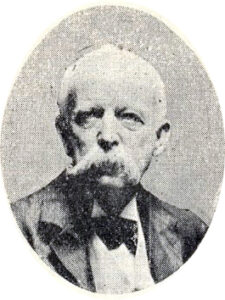
‘Advances in Asia and Imperial Consolidation in India’. The Geographical Journal, 17(3), 1901, pages 240-250. doi:10.2307/1775225. The great Superintendent of Frontier Surveys in British India, Colonel Sir Thomas H. Holdich, K.C.I.E., C.B., R.E., was a good acquaintance of Bent’s, the latter travelling to India to consult him. Holdich gave an elegiac summary of explorers on the occasion of the end of Queen Victoria’s reign: “It seems fitting that on an occasion like this we should call to mind some, at least, of the names of those who have been so closely associated with this great Society, and whose voices we shall hear no more within those walls. Of the living I need not speak again. We have them with us, and we trust to meet them often; but to those who have crossed the last boundary into the great unknown lands we may well give a passing tribute of unforgetfulness. Along with General Walker we have lost many whose names were well known on the list of Indian surveyors – Basevi, Montgomerie, Tanner, Harman, that gallant explorer Woodthorpe, McNair, and many another less-known hero have passed us by; Theodore Bent has left the fields of Arabia and Africa; Elias will no more tread the steppes of Central Asia, nor Wellby; Hayward has gone, and with him that later adventurer into the stern altitudes of the Himalaya – Mummery. These all rest from their labours and their work is done.”
May 8 1897 [published June 3 in The Bookseller], at the Booksellers’ Annual Dinner, Wm Sinclair, Archdeacon of London (and at Repton school with Bent), said “he would first like to pay a very brief tribute of respect to a life-long friend whose untimely death left a visible gap in English literature.”
Ernle Bradford, The Companion Guide to the Greek Islands (1983, Collins, London, p.156): ” I can do no better than recommend (Theodore Bent’s The Cyclades] to other Aegean travellers, an impertinence perhaps to recommend Bent, but too few people nowadays seem to be acquainted with his work… It is the classic of Aegean travel in English and will never be superseded, for one good reason that Bent was lucky enough to visit the islands when they were still, as it were, intact and only just waking out of the sleep of centuries. A Yorkshireman, Bent was one of those hardy and indefatigable Victorians who make the modern traveller feel somewhat ashamed. Accompanied by his wife, herself an expert photographer, Bent spent a long time in the Aegean… He later distinguished himself in archaeological work in Asia Minor, and then – having, as it were, exhausted the ancient world – he spent most of his remaining years in the Persian Gulf, the Hadramaut, and South Africa. He was the first European to make a detailed examination of the ruins of Zimbabwe and the ruins of Axum in North Abyssinia. Bent died in 1897, from malaria contracted while on an expedition in South Arabia.
Mabel Virginia Anna Bent (1847-1929)
“THE death of Mrs. Theodore Bent on July 3, at the age of eighty-three years, has removed a striking personality for many years familiar in literary and scientific circles in London. She was the widow of Theodore Bent, whom she married in 1877. Of Irish extraction, she preserved to the end of her life some of the characteristics of her nationality, notably readiness in conversation and a sharpness in repartee.” – Mrs. Theodore Bent. Nature 124, 65 (1929). https://doi.org/10.1038/124065a0
“Mrs. Theodore Bent, who died last week at her home in Great Cumberland-place, at the age of 83, was famous for the explorations in distant lands which she undertook with her husband. This was at a time when it was much more rare than it is now for a woman to venture forth on such journeys… There can be no doubt that Mrs. Bent was of the greatest assistance to her husband in all his travels and and discoveries. She was an experienced photographer, as well as an accurate observer…During her long widowhood of more than 30 years Mrs. Bent was well known in literary and scientific London. She was a good talker, with an occasional sharpness of phrase which was much relished be her many friends…” – The Times, July 4, 1929
“MRS. THEODORE BENT. We regret to record the death, early in July at the age of eighty-three, of Mrs. Mabel V. A. Bent, widow of the accomplished traveller Mr. J. Theodore Bent, whose archaeological and other explorations in Africa and Arabia attracted much attention towards the end of the last century, and were described in a series of papers read at the evening meetings of the Society. Mrs. Bent was his constant companion on these expeditions, sharing in all the dangers and hardships involved, and collaborating with him in the publication of their results. She herself contributed to this journal a preliminary account of the 1896 expedition to the Yafei and Fadhli countries in Southern Arabia, and her name appeared as joint author with Mr. Bent of the volume published in 1900, under the title ‘Southern Arabia’ in which the various journeys in that unknown land were more fully described. She had survived her husband by thirty-two years, he having died at a comparatively early age in 1897.” – The Geographical Journal, Vol. 74, No. 4 (Oct., 1929), p. 416
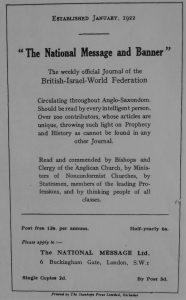
“Obituary – The Late Mrs. Mabel Virginia Anna Bent. It is with very great regret indeed that we have to announce the death of our dear friend, Mabel Virginia Anna Bent, widow of the late J. Theodore Bent, F.S.A., F.R.G.S., and daughter of the late R. W. Hall-Dare, D.L., of Newtonbarry House, Co. Wexford, in her eighty-fourth year. Mrs. Theodore Bent’s house in early days and until she was incapacitated through failure of health was always open to all who were interested in British-Israel Truth. She was one of the earliest of the British-Israel Association, and always with an open purse and open house to all Evangelical endeavours for the advancement of the Kingdom of God, she will be greatly missed by all her knew her. But especially will our Federation miss her ever-willing and generous gifts on behalf of the work, and her presence always at all our Council meetings until her seizure, about two years ago. She always loved to make her house a home for the former Secretary of the British-Israel Association, and ever since 1907, whenever he was brought to London in connection with the work or otherwise. We but express the sentiment of all our friends in thanking God for having given us such an example of a cheerful giver and a patient sufferer to His Will. Personally, I have lost a dear loving friend, ever ready with a welcome to make her house one’s home. We tender our hearty sympathy to all she has left to mourn her loss. She is but ‘gone before’.” – L.G.A. Roberts, The National Message and Banner, 13 July 1929.
“Mrs. Theodore Bent has died at her home in London. She was the widow of James Theodore Bent, the explorer and writer. Mabel Virginia Anna Hall-Dare was born at Wennington, Essex, in 1846 [actually Beauparc, Co. Meath, in 1847]. In 1877 she was married to Mr. Bent and became his companion in all his wanderings…” – The Paris Times, 5 July 1929.
“Irish Woman Explorer – Mrs. Theodore Bent, who died at her home in Great Cumberland Place, London, at the age of 83, was famous for the exploration in distant lands which she undertook with her husband. This was as a time when it was much more rare than it is now for a woman to venture forth on such journeys. She was the second of the four daughters born to Mr. Robert Westley Hall-Dare, of Newtownbarry, Co. Wexford, and East Hall, Wennington, Essex, by his marriage to Frances Anna Catherine, daughter of Mr. Gustavus Lambart, of Beauparc, Co. Meath, who was descended from a younger son of the first Earl of Cavan. She was an experienced photographer as well as an accurate observer.” – Witness (Belfast), 5 July 1929.
“Mrs. Theodore Bent – The death occurred at her home in London yesterday of Mrs. Theodore Bent, the widow of J.T. Bent, the explorer. Mrs. Bent accompanied her husband in his journeys through Arabia, Abyssinia, the Sudan, and Rhodesia, and collaborated with him in the books descriptive of their travels, and wrote several travel books herself [sic].” The Guardian (London), 4 July 1929 [Mabel’s only travel writing, apart from her personal ‘Chronicles‘, was the work she did to prepare ‘Southern Arabia‘ for publication (1900). This was no minor achievement]
“Veuve de l’explorateur Théodore Bent, mort en 1897, et sa collaboratrice dans tous ses voyages, Mme Th. Bent est morte au mois de juillet 1929, à l’âge de 83 ans. Le couple avait commencé par visiter les Cyclades, Carpathos, Samos, Thasos, également curieux d’archéologie et de folklore (1883-1887); puis il passa en Carie, en Galicie, dans le golfe Persique (îles Bahrein) et, en 1891, dans l’Afrique du Sud (Zimbabwe dans le Mashonaland). Enfin, M. et Mme Bent recueillirent des inscriptions et des documents de tout genre en Abyssinie, dans le Sud de l’Arabie, à Socotra (1897). L’ouvrage sur l’Arabie du Sud (1900) a été écrit par Mme Bent à l’aide des notes qu’elle avait prises avec son mari.” Revue Archéologique, 1929 (vol. 2, juil-dec), p.131.
“A Woman of the Victorian Age – I confess with shame, that until I read that she had died only yesterday, I had thought of Mrs. Theodore Bent as having passed beyond these voices years ago. The last time I sat beside her at a dinner of writing women seems so long ago, and she did not look young even then. Whatever of milk and roses may have been originally in that Irish skin of hers, it was tanned to the hue of pale leather by decades in the islands of the Aegean, in Asia Minor, the Persian Gulf, South Africa, Abyssinia, and the other sun-kissed, ardent, dreamy, beautiful, desolate, untravelled places, whither she had gone as an eager soul with her English husband. Mrs. Theodore Bent, even when she was well past three-score and ten, did not fit quite contentedly in a London environment. I wonder if the young women of to-day who think the world began when they came along, would have the courage and stamina to endure what Mrs. Bent suffered with a smile. There was a time, for instance, when she was told to dismount from her horse in order that attackers might have the pleasure of slitting her throat.” Liverpool Post and Mercury, Friday, July 5, 1929.
(The London Daily Chronicle of Thursday, 22 August 1929 recorded that “Mabel Virginia Anna Bent, of Great Cumberland place, W., widow of James Theodore Bent, the explorer” left an estate worth (gross) the somehow clarion-like sum of £11,111.)
Members of Mabel’s Immediate Family
“We very much regret to record the untimely death of Charles Hall-Dare, younger son of the late Mr. Hall-Dare of Newton Barry, Ireland, and of Theydon Bois in this county… The funeral took place on Saturday last at Theydon Bois… the following members of the family being present:- Miss Olivia, Miss Mabel, Miss Frances Hall-Dare, sisters of the deceased… The deceased was a grandson of Mr. Hall-Dare, late M.P. for this County.” (Essex Standard, Friday, 11 February 1876)
Close associates of the Bents
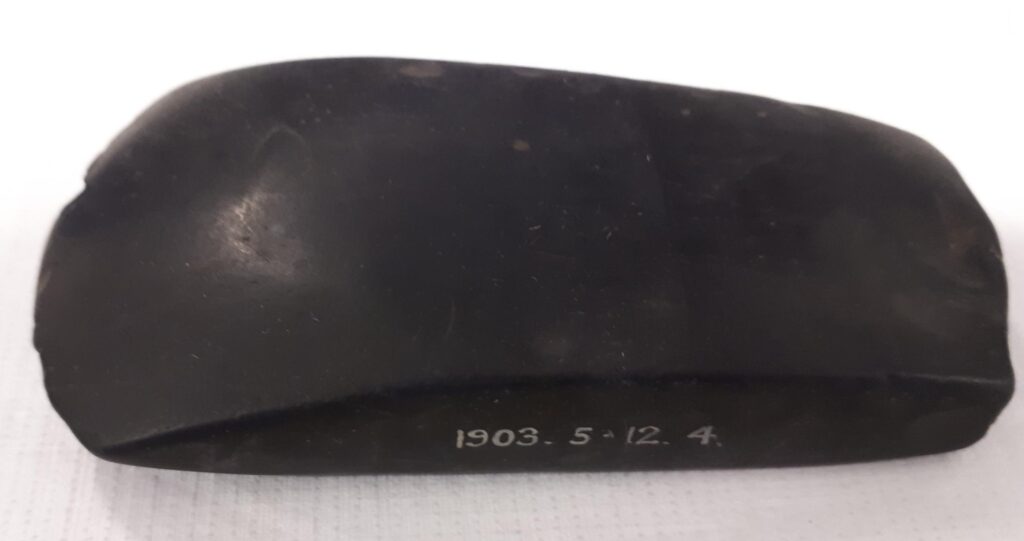
“Swan, R.M.W. (Robert McNair Wilson)L We regret to record the death, which took place on March 26th last, of Mr. R. M. W. Swan, well known for his share in the earlier investigations of the ruins of Mashonaland. Mr. Swan was born in 1858, and after receiving a technical training in Glasgow University and in the laboratory of Mr. R. Tattock, went out to Spain in 1878 in the capacity of a mining expert. In 1879 he went to Greece, and the next seven years were spent in mining work, principally in Antiparos and neighbouring islands. In addition to his professional employment, he devoted much attention to archæology, publishing several papers on his researches, and sending many specimens to the British Museum. It was during this period that he first made the acquaintance of Mr. and Mrs. Theodore Bent, whom he accompanied during their visits to several of the islands, afterwards taking part in the expedition to Mashonaland, carried out by them in 1891, for the examination of the Zimbabwe and other ruins. During this expedition he undertook the cartographic portion of the work, executing for the first time a careful plan of the ruins, besides mapping the country along the routes followed, and fixing the positions of a number of points astronomically. When, after his return to this country, Mr. Bent described the results of his journey before the Society, Mr. Swan added some notes on the geography and meteorology of Mashonaland, and subsequently contributed to the “Proceedings” (May, 1892), a short paper on the orientation of the ruins, showing in a striking way the close connection which existed between the arrangement of the structures and the astronomical phenomena to which, as sun-worshippers, their builders had paid so much attention. The subject was more fully discussed in the section which he contributed to Mr. Bent’s “Ruined Cities of Mashonaland”. The theory which he developed was subjected to some criticism; but on returning to South Africa to continue his investigations, he collected “data”, which, as he claimed, fully bore out his ideas. During this journey, carried out in 1893, he examined various ruins, till then undescribed, besides doing something to improve the mapping of the country along his route, which led inland by way of the Limpopo.
“This visit to South Africa lasted about two years, spent in part in geological and mining work. In 1896 he examined the mining districts of Western Australia and Tasmania, and in 1898 went to Siam with a similar object, leaving again, after a short visit to this country, for the Malay Peninsula, where he was engaged in mining work until his death, which took place at Kuala Lumpur after an operation for abscess of the liver. Here, as in South Africa, he did much careful cartographical and geological work.
“Mr. Swan was an expert linguist, and from his residence in Greece had acquired a great love for the classics. He possessed a large store of knowledge on varied subjects, which he was always anxious to share with others. He was a Fellow of the Geological and Chemical Societies, as well as of our own, which he joined in 1893, having received the Murchison Grant in 1892. “(Royal Society’s Journal, May, 1904)
“Anthropology has… to regret the loss during the past year of the following workers and pioneers in unexplored fields, who, although they were not actually Fellows of the Institute, have done much to further the interests of the science which the Institute represents in the country:- Mr. R. M. W. Swan was well known for his researches in Mashonaland. In 1891 he accompanied Mr. Theodore Bent, and undertook the topographical part of the work, the maps and plans of the ruined cities being due to his researches. Shortly before his death, which took place in Malacca, he contributed to the Institute a paper on Stone Implements from Pahang, which appeared in Man.” (Report of the Council for the Year 1904. (1905). The Journal of the Anthropological Institute of Great Britain and Ireland, 35, 2-5; the paper referred to is: Swan, R. M. W. (1904). 34. Note on Stone Implements from Pahang. Man, 4, 54-56)
[We are still very interested in obtaining a photo of Robert M. W. Swan, the Bents’ great friend. If you have one, please do get in touch (TheBentArchive[at]gmail.com]